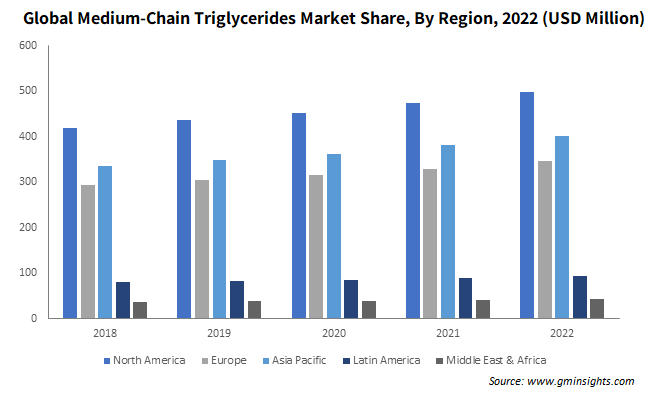Home > Food & Beverages > Food Additives > Texturizers and Thickeners > Medium-chain Triglycerides Market
Medium-chain Triglycerides Market Analysis
- Report ID: GMI5216
- Published Date: Feb 2023
- Report Format: PDF
Medium-chain Triglycerides Market Analysis
The medium-chain triglycerides market valuation from the palm source segment is poised to surpass USD 835 million by 2032. Palm seeds and kernels are widely used to manufacture MCTs due to their high production yield at 3.3t/ha as compared to rapeseed and sunflower with a 0.7t/ha yield. Palm oil is a rich source of MCTs and antioxidants offering numerous health benefits, including a healthy immune system. The growing health concerns associated with age-related macular degeneration, cardiovascular diseases, and certain cancers are also driving the consumer preference for a vitamin E-rich diet, further emphasizing on MCT oils produced from palm kernels.
The medium-chain triglycerides market share from food and beverage applications segment is anticipated to exhibit over 5.5% CAGR through 2032, powered by their extensive usage to manufacture functional foods. The rising prevalence of chronic diseases has propelled the demand for functional foods considering their ability to fight diseases, boost growth, and improve metabolic activity. Additionally, biologically active functional food components can prevent certain non-communicable diseases, such as osteoporosis, cancer, type 2 diabetes, and fluctuations in blood cholesterol. Hence, the growing consumer awareness regarding nutrition and health is expected to accelerate the market revenue.

Asia Pacific medium-chain triglycerides market size is slated to reach USD 765 million by 2032, as the region is home to an expanding pharmaceutical sector with a massive raw material supply chain. Countries, such as China are one of the largest suppliers of pharmaceutical raw materials worldwide, offering lucrative business prospects for the leading manufacturers of MCTs. Due to the availability of cheap labor, low set-up costs, and affordable raw materials, APAC has attracted several foreign pharmaceutical giants. For instance, in May 2022, Ferring Pharma, a Swiss multinational biopharmaceutical company unveiled a new formulation facility in Hyderabad, India to manufacture Pentasa. The company pledged an investment of approximately USD 65 million over the coming 2-3 years.

